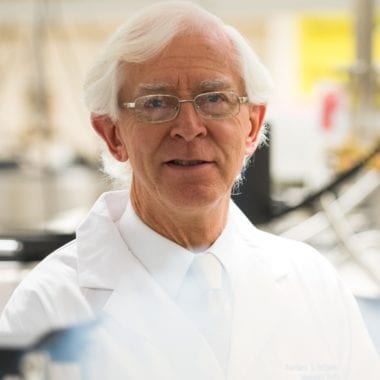A talented group of researchers, led by PHRI Senior Scientist Guillaume Pare, Director of CRLB-GMEL, are working to discover key genes and biological pathways involved in late-onset diseases, looking at genetic risk of heart attacks, strokes, obesity and dementia, establishing the clinical importance of polygenic risk scores in individuals with premature heart attacks, and more. As well, these investigators have been designing innovation methods and tools that enhance how genes and biomarkers are studied.
Integrating genetic and biomarker measurements to prioritize drug targets, Guillaume Paré and Salim Yusuf created the Biomarker Discovery Partnership Program with Bayer – building on the work of the CRLB-GMEL lab, led by Paré.
They’ve used this approach to characterize new protein drug targets for: atrial fibrillation (Pedrum Shemirani, JACC 2022); type 2 diabetes (Marie Pigeyre, Diabetes Care 2020); stroke (Michael Chong, Circulation, 2019); blood pressure (Sebastian Theriault, Circ Gen 2020); coronary artery disease (Jennifer Sjaarda, JACC 2018); and chronic kidney disease (Sjaarda, JASN 2018).
The Biomarker Discovery Program is assembling a unique multi-omics resource in 12,000 PURE participants including the testing of genomic, epigenomic, proteomic, metabolomic, and lipidomic markers. Sukrit Narula led the primary paper of the Biomarker Discovery Program, showing that circulating levels of ACE2 was a strong biomarker predictive of incident mortality and cardiometabolic disease (Lancet, Jan. 2020).
Method innovation
Paré and his team continue to innovate methods to study genes and biomarkers.
- Nazia Pathan won the prestigious International Genetic Epidemiology Society’s William Award, 2022, for RARity, a method to estimate the contribution of rare variants genetic coding to complex traits and diseases.
- Irfan Khan presented on genetically determined adiposity findings at European Association for Studying Diabetes, 2022.
- Chong created AutoMitoC to derive an emerging mitochondrial biomarker called “mitochondrial DNA copy number” from genetic microarray data (eLife 2022, Neurology 2022).
- Ricky Lali developed the RV-EXCALIBER method to better study rare genetic variants and their contribution to early-onset disease in the general population (Nature Comm, 2021).
- Sjaarda invented a framework to quantify the importance of genetic ancestry to disease biomarkers within the ORIGIN trial (AJHG 2020).
- Tafadzwa Machipisa was an author of the first GWAS for RHD in continental African ((JAMA Cardio 2021) working with the Rheumatic Heart Disease Genetics (RHDGen) consortium
- Paré and Chong, as members of the International Stroke Genetics Consortium, are conducting the largest genetic analysis of stroke to date (GIGASTROKE).


















